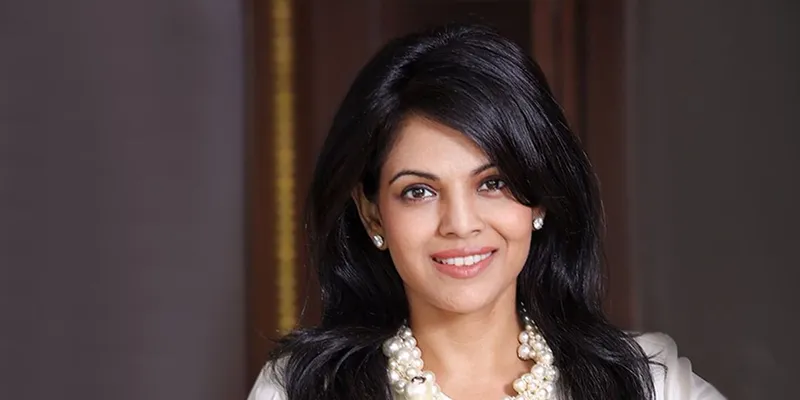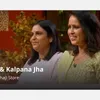[HerStory Conversations] Meet Namita Thapar and Vineeta Singh, sharks on Shark Tank India who want a fair playing field for women entrepreneurs
In a free-wheeling chat with HerStory, Namita Thapar and Vineeta Singh, entrepreneurs, investors, and sharks on Shark Tank India, speak about their experiences on the show, the pitches that moved them, and the need to manage guilt.
Season One of Shark Tank India, the desi version of the hugely popular global show, has grabbed public attention for several reasons.
The ongoing show, which began airing on Sony Television in December, is seeing entrepreneurs from all over India, a number of them from Tier 2 and Tier 3 cities, pitching their ideas, ranging from banana chips and men’s underwear to detachable sleeves and sophisticated STEM devices.
Three of the seven Sharks on the show are women – Namita Thapar, Executive Director, ; Vineeta Singh, Founder & CEO, ; and Ghazal Alagh, Co-founder, are formidable entrepreneurs in their own right.
In a freewheeling chat with HerStory, Namita and Vineeta, the initial women judges on the Shark Tank India spoke about their experiences on the show, the state of women’s entrepreneurship and why it’s imperative for women to speak out against biases and move forward.
Being a Shark was pure happenstance for Namita. A conversation about the show cropped up on a TiE Mumbai WhatsApp group she was part of, and she was excited as it was an opportunity for her Young Entrepreneurs Academy (YEA!) students. In the course of a conversation with a team member of the show, she was asked if she wanted to be a Shark.
“It came out of nowhere. It was also a busy time for me, with Emcure preparing for its IPO, my son in the 10th grade but I accepted it because it was an incredible opportunity, in different ways,” she says.
Vineeta took a really long time to agree because the shoot was around the “peak season” for the beauty industry and the quarter was very critical to her as a founder.
“The struggle of smaller companies to raise funds is never covered. The timing of the show is very apt from the perspective that a lot of people were on the verge of giving up. I feel the next 2-3 years are going to be big for revenge shopping, travelling and more. I felt if people get inspired by this whole entrepreneurial wave, seeing small businesses getting funded, it would be a game changer,” she explains.
Vineeta went into the show aiming to be gender neutral but believes that “women entrepreneurship is emerging as a strong theme”.
Be you. Everyone else is already taken
Namita and Vineeta share that there was no conscious effort to follow a particular strategy or behave a certain way on the show.

Namita Thapar, Executive Director, Emcure Pharmaceuticals
“My mantra has always been, ‘be you, the world will adjust’. I've always believed that you have to be your authentic self. You can't overthink, over plan; at the end of the day, it's a reality show. And whatever you are inside and whoever you are, will come through. If you're proud of who you are, you don’t have to put up a show or posture. The purpose was to support a cause – to encourage the startup ecosystem of the country,” says Namita.
Vinita reveals that the channel had no guidelines on how they should behave on the show.
“They told us that if we were thinking something, say it out loud because the audience doesn’t understand how the food tastes or how a material feels. We are all ourselves, and that’s why we are able to bring in diverse approaches to the way we look at pitches or investing.”
Both are all praise for the inclusivity on the show where the organised ensured enough representation from smaller cities, women from different sectors and age groups.
She elaborates, “Companies that are in the race to get heavily funded by VCs, the top one percentile won’t come to a Shark Tank, because they already have a lot of access to capital. I can say the show offered a good mix of the companies that were in the two percentile even going all the way down to 70-80 percentile in terms of ranking to bring a whole new diversity.”
Namita agrees. “At Shark Tank India, out of the ventures we funded, 15 percent were women-led and 49 percent had female co-founders. And according to Harvard Business Review, only 2.3 percent female-led ventures get funded globally. I think it’s incredible what we have achieved in season one. It gives a strong message to the startup ecosystem,” she adds.
Among the pitches funded, Vineeta speaks fondly of Malvica Saxena of Quriky Naari (a funky footwear brand) from Mathura, who hails from a traditional business family where her parents just expected her to graduate and get married. Then there’s Jimmy Shah, who founded a sugar-free ice-cream brand along with her two children, who “has so much clarity of purpose”.
“I loved the skincare brand AuLi by Aishwarya Biswas who is simply phenomenal. I am also very optimistic about Aditi Gupta and Menstrupedia. And the third is Sanskriti, the CEO of Thinkerbell that works with visually-impaired kids. I met all these women – outside the show and the vibe was reinforced,” Namita says.
Trolling and bonding
Namita is dealing with online trolling with grace and a lot of humour.
“Right from calling my smile fake, calling me a fake feminist, the trolling has been endless. But, I believe if you are secure and happy with who you are, then you are a good sport and ignore the mean stuff. Some of the stuff is super creative, and I have shared it on my Instagram handle,” she says.
Vineeta shares that the bonding with the other sharks has been special and they are looking to “lifelong connections”.

Vineeta Singh - Founder & CEO, Sugar Cosmetics
State of women’s entrepreneurship
The biggest thing, the women investors believe, is women looking up to other successful role models.
“I am inspired by Falguni Nayar of Nykaa, who led an IPO, has 51 percent of the company and has built a profitable business in a short period of time. I feel this will drive 10 more women to lead IPOs in the near future and become 100 Cr profitable businesses,” she explains.
Unfortunately, she says, a number of venture capitalists in decision making positions are less than one percent women solving problems in women’s health, D2C, consumer products – which may be hard for men to relate to.
Namita adds that highlight stories of women entrepreneurs is equally important.
“As Indians, culturally, we are not okay about speaking up about biases and negativity we have faced. If we talk about them, we feel we may be construed as a feminist, using the woman card or indulging in self-victimising. We need to speak about them and come out of denial.”
Vineeta urges women to “think big” and not be afraid to be ambitions.
While Namita agrees women are great time management, we are terrible at guilt management.
“We need to get rid of the guilt, get comfortable with failure and find time to listen to our inner voice,” she says.
Edited by Affirunisa Kankudti


![[HerStory Conversations] Meet Namita Thapar and Vineeta Singh, sharks on Shark Tank India who want a fair playing field for women entrepreneurs](https://images.yourstory.com/cs/4/8e7cc4102d6c11e9aa979329348d4c3e/CopyofImageTaggingNewBrandingEditorialTeamMaster7-1642917611963.png?mode=crop&crop=faces&ar=2%3A1&format=auto&w=1920&q=75)


![[RAISE 2020] How two childhood friends are making knowledge accessible through a one-stop video localisation startup](https://images.yourstory.com/cs/2/e641e900925711e9926177f451727da9/Untitleddesign-1605526651387.png?mode=crop&crop=faces&ar=1%3A1&format=auto&w=1920&q=75)


